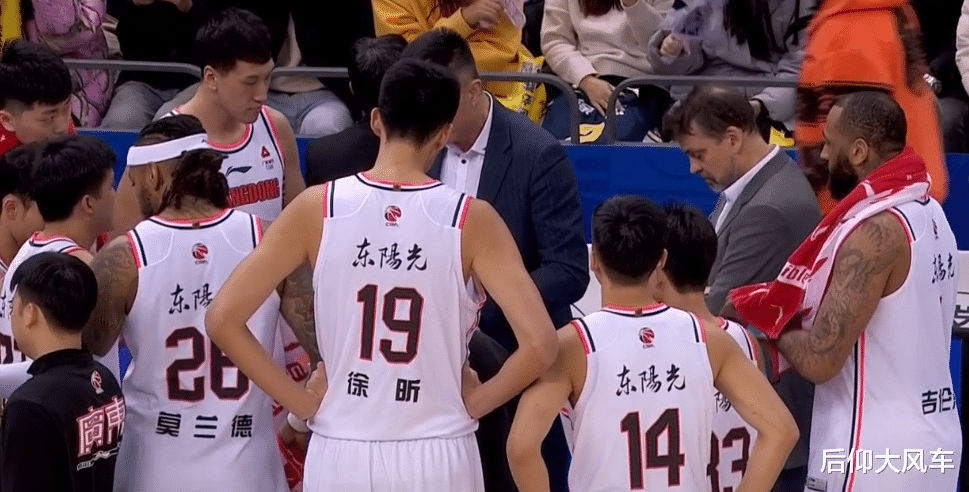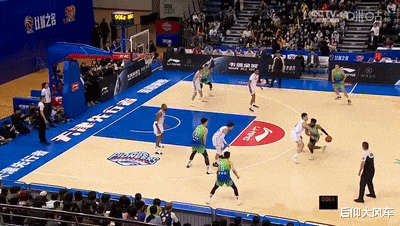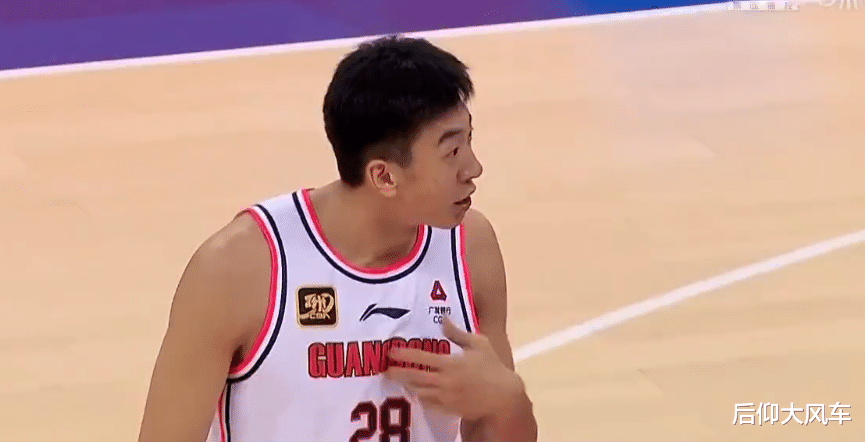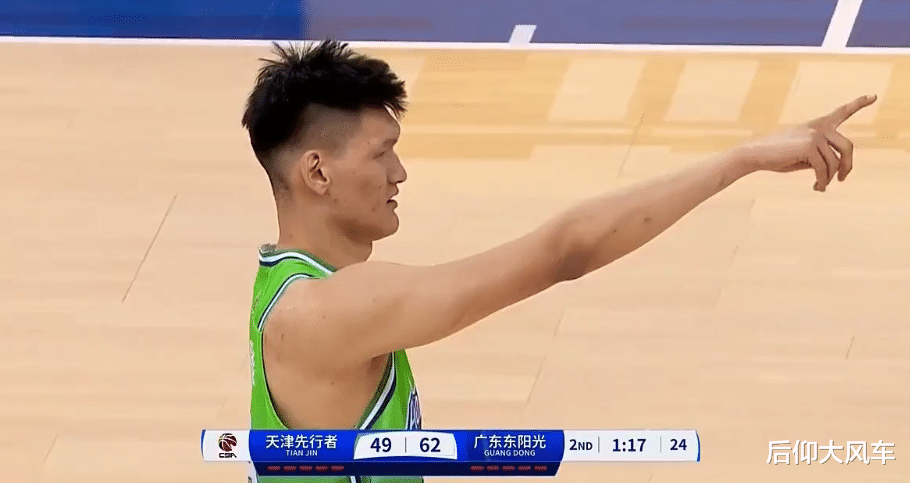The intense second battle between Tianjin and Guangdong has concluded, with Guangdong finally breaking their psychological barrier by securing a 4-game winning streak in Tianjin's home court, avenging their narrow overtime loss from the previous season's final round of the regular season. However, despite the victory, there was once again heated discussion among Guangdong fans post-match, with many questioning Du Feng's decision not to play Xu Xin.

Before the game, Guangdong registered 12 players, including their two youngest players, Xu Xin and Yang Yi. Throughout the match, Yang Yi only played for 7 seconds (immediately substituted after committing a foul that allowed Laviet to take two free throws), while Xu Xin did not play at all, leaving many puzzled. To address this issue, let's first consider what Du Feng had to say after the game.

During the post-game interview, Du Feng stated: "Tianjin's playing style is very clear, focusing on outside shooting. Once they get going, it puts immense pressure on us. In this game, we did better than before in controlling Tianjin's outside shooting. However, after leading by 17 to 18 points in the first half, we allowed our opponents to close the gap in the second half, falling back into old habits."

Du Feng's comments highlighted Tianjin's characteristics as a three-point shooting team. Once they find their rhythm, they can easily go on a scoring spree. Despite leading by nearly 20 points in the first half, Guangdong still couldn't completely stop Tianjin's outside shooting, allowing them to reduce the deficit to just 6 points in the fourth quarter. During this period, Tianjin not only repeatedly shot from outside but also continuously attacked Guangdong's inside rebounds, gaining numerous second-chance opportunities (Tianjin had 24 offensive rebounds compared to Guangdong's 13). In this game, Tianjin attempted 45 three-pointers and made 15, maintaining a high volume of three-point shooting but with only a 33% accuracy rate, indicating that Guangdong managed to restrict Tianjin's outside shooting to some extent.

How did Guangdong achieve this restriction? There weren't many methods; it mainly involved running more in their defensive strategies of zone defense and man-to-man marking, matching Tianjin's pace. Not only the perimeter players but also the centers needed to occasionally step out to cover positions. The starting veterans, Morland and Gillenwater, both had good mobility. However, even with Morland and Beazley on the court, Guangdong still left many defensive gaps. Du Feng needed Gillenwater's offense, so defensively, someone needed to step up and cover for Gillenwater, reducing his defensive workload. Therefore, pairing Xu Xin with Gillenwater to primarily defend the paint wasn't realistic.

The substitutes, Er Fei and Wang Shaojie, were both mobile power forwards capable of switching defenses. In the fourth quarter, Du Feng made adjustments, initially deploying a three-guard lineup but found they were conceding too many points. Consequently, Du Feng had to substitute Morland and bring in Gillenwater, Wang Shaojie, and Zhang Haojia early, switching to a 4-forwards-1-guard lineup to strengthen rim protection and lineup height while ensuring mobility.

Wang Shaojie performed well in this game. Facing Tianjin's outside shooting, Wang's positioning and defensive assistance were commendable. In the final quarter, he engaged in multiple battles with Tianjin's main forward, Shi Deshuai, wearing him down and causing him to miss three free throws.

If Xu Xin were to play, he would have to face two opponents: Tianjin's center, James, and Gao Shi'ao. From Coach Du Feng's perspective, since the opponent is a three-point shooting team, Guangdong's defensive resources need to focus more on the outside. Xu Xin, in terms of physical endurance, defensive experience, or offensive firepower, hasn't yet reached the level of Liu Chuanxing, Zhou Qi, Han Dejun, or Yu Jiahao, where Tianjin would be wary of him.

It's not just that Du Feng fears Tianjin's three-point shooting; Zhang Qingpeng also fears Guangdong's three-point shooting. Therefore, in this game, both he and Du Feng coincidentally abandoned their respective big centers. Gao Shi'ao, who is the same height as Xu Xin, didn't play much, only appearing for 41 seconds. The cunning Zhang Qingpeng let Gao Shi'ao play for two rounds towards the end of the first half, attempting to lure Du Feng into playing Xu Xin, but Du Feng didn't fall for it. As a result, Zhang Qingpeng simply gave up using Gao Shi'ao in the second half.

Zhang Qingpeng's calculations were quite shrewd. He actually hoped Du Feng would play Xu Xin so that James and Shi Deshuai could directly engage with Xu Xin, exploiting Xu Xin's inability to come out of defense to shoot three-pointers or using his slow footwork to break through directly.

In the previous round against Shenzhen, Xu Xin performed outstandingly, scoring 12 points, grabbing 2 rebounds, and blocking 3 shots in 18 minutes, becoming a valuable helper in the paint for Gillenwater. Xu Xin was able to receive significant playing time for two reasons: firstly, Morland committed too many fouls. Shenzhen's foreign player, Thompson, repeatedly dominated Guangdong's paint in the first half, forcing Morland to sit out early after accumulating three fouls. This provided Xu Xin with an opportunity to play, and after scoring 4 points in quick succession upon entering the court, his confidence soared, impressing Du Feng.
Secondly, Shenzhen's outside shooting was abysmal. In that game, Shenzhen attempted 38 three-pointers but only made 6, missing many open shots. Since Shenzhen couldn't effectively hurt Guangdong by breaking their zone defense, it further solidified Guangdong's determination to maintain their zone defense strategy, allowing Xu Xin to stay on the court. However, Xu Xin also had to rest for an entire quarter before being able to continue playing.
This game's opponent differed from Shenzhen, with Tianjin's offense centered around outside shooting, opting for fast-paced three-point attacks instead of low-post plays. Given Xu Xin's current physical condition, it was better for him not to play and conserve energy for the next round against Qingdao, which is more practical. After all, Qingdao's game rhythm primarily revolves around set-piece attacks, significantly slower than Tianjin's. The real highlight will be Xu Xin's matchup against Yang Hanshen in the next round.